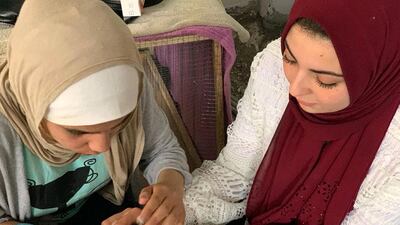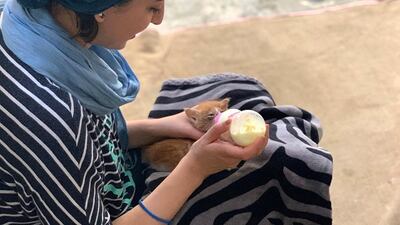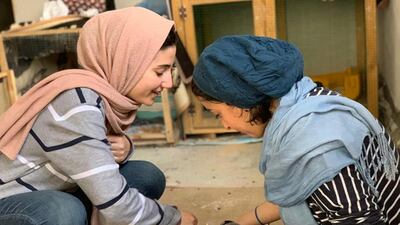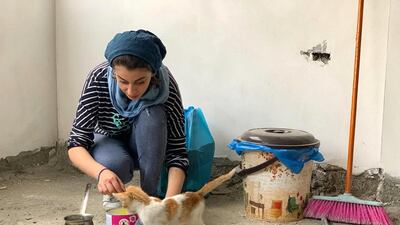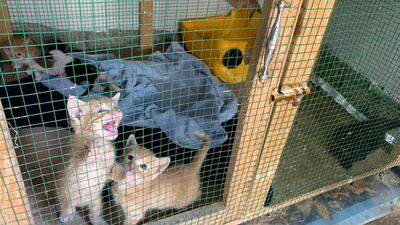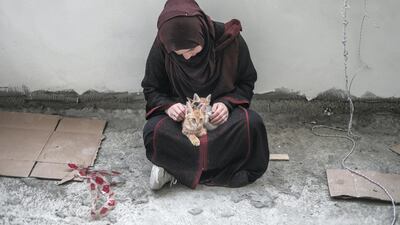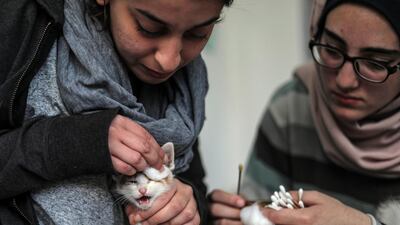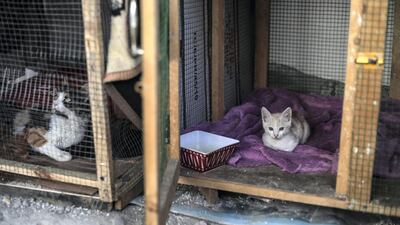The residential building in Gaza City is still under construction but a number of cats have already taken up residence on the second floor, installed there by the first group dedicated to caring for strays in the Gaza Strip.
On a recent visit, the four-room apartment in the Alremal neighbourhood was filled with the mewing of kittens as three young women tended to their needs. Small coloured toys littered the concrete floor and the walls were lined with photos of cats, cartoons and sheets of paper on which the members of Strays of Gaza leave notes for each about the care of their charges.
"I love animals and like to care for them,” said Razan Najar, a 28-year-old literature graduate, as she sat on the floor feeding a kitten, one of 12 cats kept in four cages. "I learned about caring for cats from YouTube channels and surfing the web."
With so many stray cats on the streets of Gaza, the group takes in only those that are injured, ill or too young to survive on their own. After they are treated by a vet and nursed to full health, Strays for Gaza offers them up for adoption on Facebook and on Instagram, where they have about 3,000 followers.
"We manage to get most of the cats adopted and we follow up by asking for photos and videos" from their new owners, said Rama Barakat, 20-year-old student of English and French literature.
The idea for the group started when Amnna Alsosi, 22, found a newborn kitten alone in the street.
"I took it home and cared for it alongside my own cat," said Ms Alsosi, who is also a student of English and French literature and names all the strays the group takes in, based on their characters.
In 2015, Ms Alsosi and about a dozen other students set up a Facebook page called "Strays of Gaza" to encourage people not to mistreat homeless animals and to feed them if they could.
"We started to receive calls from people who found stray cats and dogs and wanted us to take care of them," said Ms Barakat.
"This place is donated by a family who likes our campaign and wants to support us until we find suitable homes for the strays," Ms Barakat said.
The group's work is funded mainly by donations from people in Gaza, Ms Alsolsi said. They get some funding from people outside territory through a GoFundMe account “but not a lot”.
"We need around 400 shekels (Dh410) a month for food, medicine and vet fees," she said. "Sometimes we spend our own money to buy medicine for the sick cats, because we can't wait, and the doctors examine the cats for free."
Their work has drawn criticism from some in the Palestinian territory, where many of its 2 million residents are suffering the effects of an Israeli blockade that has lasted more than a decade.
"We faced a lot of negative reactions from people who told us to give the money for humans not animals, but we believe that animals also need care and help and this keeps us going,” said Ms Alsosi. “On the other hand, we have received positive messages from people who want to take part in our campaign.”
In Gaza's conservative society, the young women in the group face resistance for other reasons as well.
“My family understands my volunteer work, but sometimes I have difficulty convincing my mother to let me leave home late," Ms Najar said. "In a society like Gaza, it is not easy for girls to work late."
Strays for Gaza's goal is to one day have a permanent shelter for animals instead of being based in an apartment.
"We dream of establishing a home for strays and letting people understand the importance of caring about animals," said Ms Alsosi.
